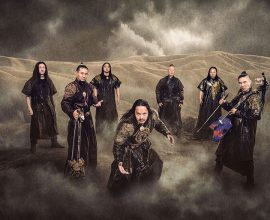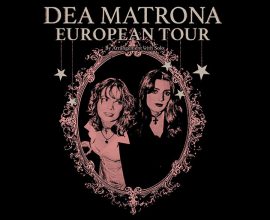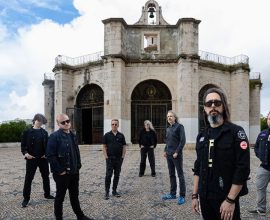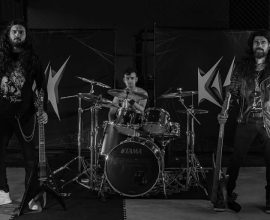Cepheidae Variable: “Even after the album is finished, I still find myself thinking about the flow of events in different ways”
“Primordial Reverie,” the latest work from Cepheidae Variable, is described as both deeply personal and cinematic. The album began as a casual project but quickly evolved into an intense record of emotions, shaped by significant events in the artist’s life — from his father’s cancer diagnosis to the arrival of his first child. With a blend of orchestral sounds and electronic atmospheres, the album takes listeners on a journey of turbulence and hope, merging elements of progressive metal with symphonic layers and synthesizers, all while maintaining a unique and personal identity.
By Sandra Pinto
In this interview, Cepheidae Variable delves into the creative process, the challenges of production, and how moments of crisis and personal transformation shaped the sonic narrative of “Primordial Reverie”.
Primordial Reverie is described as both deeply personal and cinematic. What moment or
feeling first sparked the idea for this album?
Primordial Reverie started as an unserious project. Carving a Dragon’s initial riff came about during an improvisation in a video sent to a friend. I liked the riff, so I started working on the song. Somewhere during the writing process for this song, a few things happened. Firstly, I
realized, I quite enjoyed how it was turning out. Secondly, my father was diagnosed with cancer, and finally, my wife became pregnant. This created a lot of mixed feelings in my life, and drove me to want to turn this into a serious project that I could be proud of. It was probably a bit of existentialism combined with wanting to have something tangible to show for all the years I’ve dedicated to music.
The project began as a casual creative outlet but took on new meaning after your father’s
cancer diagnosis and your own journey into fatherhood. How did those experiences shape the
tone and direction of the music?
These events shifted the tone at various points. This is especially visible in the shift between Zephyr of Ouroboros and Encounter. The more symphonic openings of the album are a bit melodramatic due to grappling with those immediate feelings. Encounter marks a shift where
I let some of those feelings wash away, and just wanted to have fun with things. By the end of the second act of the album, marked by the track Chromatic Haven, my father and wife were both seemingly doing very well, and my musical tastes started to be more accurately defined. Less colored by external influence, I feel like these tracks are more of a true representation of how I've progressed as an artist.
You’ve said the album mirrors turbulence and hope, how do those emotions reveal
themselves across the three acts?
The first act of the album was very much colored by recent events. Carving a Dragon through Zephyr of Ouroboros has a melodramatic feeling, but can also be uplifting and nostalgic.
Encounter to Chromatic Haven is really where the album starts to come into its own. Things are more fun and progressive, while also being very all over the place as far as genre influence.
Finally, we have Entropic Harvester, Singularity, and Overture. Overture may be the first track; however, it is meant to foreshadow what is to come. It was also written very late in the process. Carving a Dragon through to Chromatic Haven can be thought of as a flashback. These tracks were after my father started treatment, my wife was later in the pregnancy, and my own emotions had stabilized. This allowed me to really experiment and also compose with a bit more forethought about how I wanted to close out the album, rather than being entirely driven by emotion.
This idea came about quite early on. With a very defined sound by the performed instrumentation, I wasn’t very concerned with varying the soundscapes to suit this. I confidently introduced the synths with Encounter and made sure to keep all the natural string tonality out of this song. Only bringing it back later on with Singularity, which was meant to play on all the previous tracks.
One thing I grappled with is how to make this shift seem natural. This is how the opening track Overture came about. Made up almost entirely of synths and heavily processed guitars, it allowed me to give a glimpse that this is not an entirely symphonic album.
You’ve mentioned that your process is highly visual. Do you imagine specific scenes or stories while composing?
I typically have a scene in mind for each section or track. I also had a well-defined idea of how I wanted the album to flow in its entirety. The visuals themselves are not concrete enough that I won’t change them on a whim. Even after the album is finished, I still find myself thinking about the flow of events in different ways.
What was the most challenging track to write or produce, and why?
I struggled a lot with writing The Conduit. It’s a very strange track compositionally, despite sounding fairly simple. I think I sat there for 2 weeks, not adding a thing beyond the first choppy rhythm. From there on out, and prior to, the writing process was quite painless. Production-wise, I struggled a lot with Carving a Dragon. This is the track I defined the album’s sound with. It has a large amount of layering, which makes it easy for instruments to get lost or step on each other. I also had to balance the tonality of this track with later tracks that utilized synths over natural strings. I also struggled a fair amount with Zephyr of Ouroboros, specifically the lead melodies that move between unison and harmony with the strings. Though I am very happy with how that particular track turned out in this regard.
One of the problems I ran into is that the production on this album is not typical of my tastes. The mix resembles more of a classic progressive metal album than something very big and modern. I grappled with this a bit; however, I quickly realized that I couldn’t hear the album any other way. It might not be perfectly suited to my tastes, but the album sounds exactly as I believe it should.
The single “Carving a Dragon” feels uplifting and heroic, while “Singularity” dives into something darker and more complex. How do these contrasting moods fit into the album’s narrative arc?
Carving a Dragon’s uplifting feel is very much meant to symbolize setting out on a journey. Think Frodo leaves the Shire, Rand al’Thor leaves The Two Rivers. Except the character is actually searching for a means to leave their planet. Singularity occurs after the main conflict of the album. The Entropic Harvester is defeated, and now we’re exploring the world we encountered it on. This track is meant as a reflection
of all the previous, bringing back some orchestral elements and switching genres frequently. It also ends where it began, with Overture performed on a heavily layered guitar section. The melancholic nature of this track comes from the overarching story I had. The planet our
protagonist arrives in has no life left on it. The Entropic Harvester consumed all, and they’re left to die here with no fuel to escape.
You cite influences like Dream Theater, Haken, and Wintersun, yet Primordial Reverie sounds very much like its own universe. How do you balance inspiration with originality?
I find this very easy in my case for a simple reason. I’ve barely learned any progressive metal on an instrument. I’ve listened to it and studied it extensively, but focused almost entirely on technique and writing.
I think this allows inspiration to have a bit less direct influence over my writing and playing tendencies. I’ve played through a fair amount of Dream Theater’s earlier catalogue, never learned anything of Haken until recently, and Wintersun is a more recent taste that occurred after the time I was learning a lot of other bands music.
The artwork by Alex Eckman-Lawn perfectly captures the album’s sense of cosmic wonder and isolation. Did you collaborate closely with him, or did the artwork influence your final musical direction?
This artwork was actually licensed and not commissioned specifically for this album. We discussed a commission; however, the moment I saw this piece I started relating it to the music. It had a very heavy influence over the latter half of the album. I typically enjoy metaphorical or mysterious artwork. Something open to interpretation. I experienced exactly as you describe, a sense of cosmic wonder and isolation, which I’m sure may be nothing like what Alex had in mind when creating it.
Alex’s work ranks amongst my favorite album artists. He has been a pleasure to converse with, and I hope to work more closely with him on future releases tied to this project.
You’ve hinted that Cepheidae Variable might one day expand beyond instrumental music. What do you envision for the project’s future: collaborations, vocals, or even live performances?
I will likely expand this project with vocals in the future. I have a fair amount of potential collaborations lined up, I cannot speak of at this time. The reception from industry colleagues has been very positive. Live performance is uncertain at the moment; however, I will be
making a small appearance at Matthew Mills booth at NAMM 2026.
The album title Primordial Reverie suggests both something ancient and dreamlike. How did you land on that name, and what does it represent to you personally?
The title has a couple of meanings. Most directly, it refers to the protagonist’s first waking dream being traveling the stars. It also more metaphorically represents the depth of my own dream to release music one day. Finally, it ties into the recurring theme of my debut. It is the
first Reverie from this project, just as Carving a Dragon symbolizes the creation of both the album and the artist.
As a solo artist handling composition, performance, and production, how do you stay objective about your own work during the creative process?
I don’t think about composition too much. I’m of the mind that something can always be different but not necessarily better. I write until I get the emotional reaction from myself out of a section and then move on.
Performance I am always very objective with, because I don’t consider myself a great guitarist. I am very dedicated, but not a natural talent. I have a level of perfection I require from my recordings that borders on obsessive. I’m sure I’ve thrown out more perfectly good takes than I kept, simply because I would rather be positive something is good at the performance level, than over-edit and have to sort through takes after. For production, I do consult with colleagues whenever I’m unsure about something, or simply fatigued from listening too many times. I also dive heavily into reference tracks and testing on a wide range of listening hardware.
The album is structured like a journey with recurring motifs and tonal shifts. Did you plan this concept from the start or did it naturally evolve as you wrote?
This is something that was planned as soon as I determined this would expand to an album. I only listen to albums in their entirety, so it’s fairly natural for me to think in terms of the album format rather than track by track. Every track should have an intro, climax, and outro,
but so should every album in my mind.
Instrumental music relies heavily on emotion and atmosphere. How do you ensure your listeners still connect deeply without lyrics to guide them?
For me this comes through the heavy use of layering, and treating each instrument as a serious section rather than just “post-production”. The album may not have vocals, however, everywhere that would naturally have them is instead replaced by layers of melody and
harmony. One of the most important things I look for in instrumental music is the ability to have memorable sections. Something I believe has suffered a bit as music has become more technical and extravagant is that tracks tend to blur together. I wanted to make sure that if I
asked someone their favorite section of a track after they listened to it, there was a good chance something really stood out.
If listeners could take away one feeling or message after finishing Primordial Reverie, what would you want that to be?
That they should listen to it again! I don’t really have any message to tell; I just want people to enjoy the music, and also think “wow, that was actually good”, considering this is a debut from a previously unknown artist. There is so much excellent music out there nowadays; the one thing that I’ve been very happy to hear across the board is that this music sounds unique.





